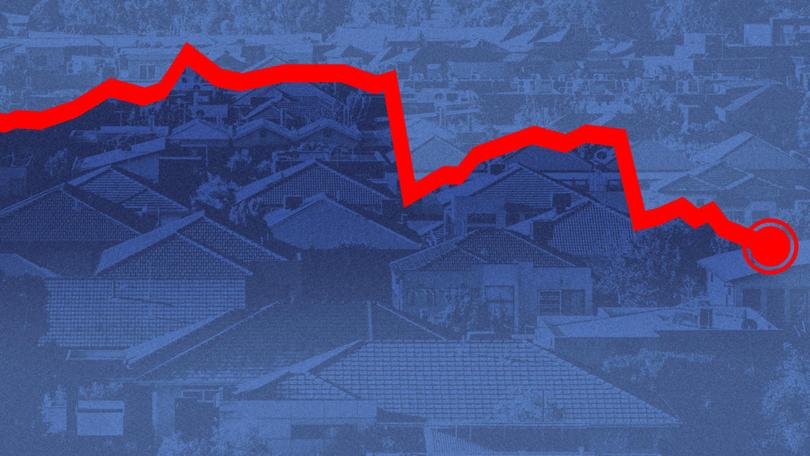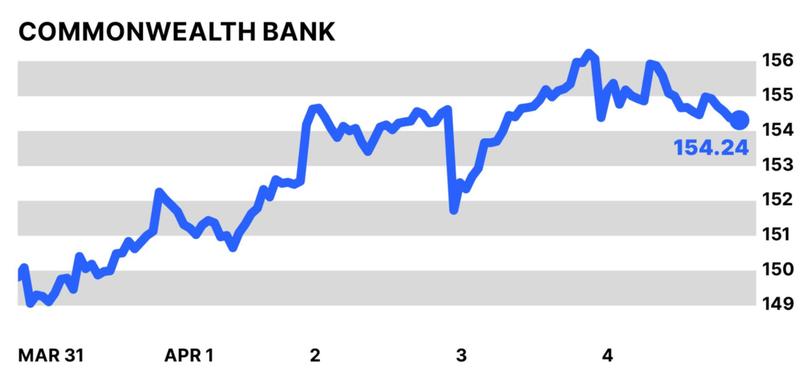AARON PATRICK: A global trade war could be good for the value of your home
AARON PATRICK: As global financial markets convulse under the weight of a presidential-initiated global trade war, there is one market that already looks like it may get a Trump bump: Australian property.

As global financial markets convulse under the weight of a presidential-initiated global trade war, there is one market that already looks like it may get a Trump bump: Australian property.
Institutional investors are pricing in a 30 basis point cut (a 0.3 per cent reduction) in official interest rates in May.
They see a one-in-five chance of a 50-basis point cut, an emergency measure only used by the Reserve Bank of Australia in dire circumstances. Bank economists do not see a monster-size cut as likely. But they do not dismiss the prospect either.
Sign up to The Nightly's newsletters.
Get the first look at the digital newspaper, curated daily stories and breaking headlines delivered to your inbox.
By continuing you agree to our Terms and Privacy Policy.The financial consequences would great. For the average 30-year mortgagee, who owes $665,978, a 50-point cut would be worth around $2600 a year - or five times the size of the tax cut promised in last week’s federal budget.
“A lot can happen in the almost seven weeks to the next RBA meeting, so we can never say never to a 50bps cut,” Challenger economist Jonathon Kearns said in an email. “But the RBA would need to see some forward-looking indicators turning quite sharply to make that call.”
Deflation?
Even though tariffs will raise prices in the US, they may lower prices in Australia. Prices for some products will fall as China sells cheap BYD cars and other goods in Australia previously destined for America, according to bond-market investor Christopher Joye.
“We’re going to have actually a lot of deflationary forces – cheap goods – that result from the trade wars,” Mr Joye said this week on the Mark Bouris podcast, Straight Talk.
The only reason rates have not fallen more is because inflation has been slow to drop.
Even if the May cut is only one quarter of a per cent, investors are betting official rates will hit 3 per cent by the middle of next year, down from 4.1 per cent today.
On Friday HSBC’s chief economist, Paul Bloxham, doubled his rate-cut prediction to one percentage point, figuring cheaper goods from Asia will push down inflation. He was ranked Australia’s most accurate economist in 2024 by one newspaper.
Information gap
The future is unpredictable. Bank economists are not investors. They admit they do not know what the impact of the trade wars will be on inflation, which will determine what happens to interest rates.
Tariffs “MAY be deflationary,” said Westpac Banking Corp’s Justin Smirk in an email, “but at this stage we have no idea of the timing or magnitude of such an impact.”
If rates are heading down, history indicates property will rise. The Reserve Bank lowered rates in March, prompting an increase in all capital cities, apart from Hobart.
There is not a futures market for houses and apartments, but there is a proxy: banks, which make bigger profits when house prices go up, because people take out larger loans.
CommBank’s up
As share markets around the world slumped this week, Commonwealth Bank of Australia rose 3 per cent to $154.38. The former government-owned savings bank is now worth more than Goldman Sachs, the world’s most-famous investment bank.
One of the leading property forecasters, SQM Research, predicted at the start of the year prices would rise six to 10 per cent if rates were cut in March. That prediction now looks conservative.

Owners feel more affluent when property prices rise, even if they do not have more cash. Which means, once again, Australians might dodge the worst effects of another foreign economic crisis.

